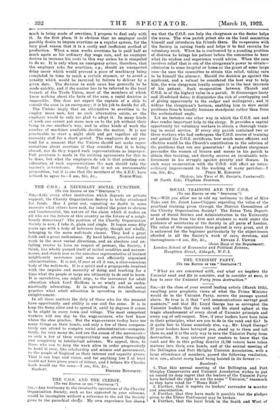THE C.O.S. AND THE CLERGY.
[TO THE EDITOR OF THE " SPECTLTOR."3
Sia,—Any testimony to the invaluable operations of the Charity Organization Society, such as has appeared in your columns, would be incomplete without a reference to the aid the Society gives to the parochial deity. My own experience has shown me that the C.O.S. can help the clergyman as the doctor helps the nurse. The wise parish priest sits on the local committee himself and introduces his friends there. He co-operates with the Society in raising funds and helps it to find recruits for voluntary work. When he is confronted by a puzzling problem of distress he brings his patient before the committee to hear what its wisdom and experience would advise. When the case involves relief that is out of the clergyman's power to obtain— admission to some hospital or home or the grant of some large sum—he uses the committee to obtain this relief, taking care to be himself the almoner. Should the decision go against the applicant, and a refusal be considered the best way to help him, the wise clergyman loyally accepts it in the best interests of his patient. Such co-operation between Church and C.O.S. is of the highest value in a parish. It discourages hasty and ill-advised doles; it diminishes the risk of overlapping and of giving opportunity to the cadger and malingerer; and it widens the clergyman's horizon, enabling him to view social problems from broadly humane standpoint rather than from the ecclesiastical angle.
Let me instance one other way in which the C.O.S. can and does render important help to the clergy. It provides a capital opportunity for voluntary workers to obtain a thorough train- ing in social service. If every city parish contained two or three workers who had undergone the C.O.S. course of training and gained the C.O.S. certificate, how much more efficient and effective would be the Church's contribution to the solution of the problems that vex our generation! A prudent clergyman persuades the women of leisure and means in his parish to obtain this training, and thereby secures an invaluable rein- forcement in his struggle against poverty and disease. In such ways co-operation with the C.O.S. will effect an extra- ordinary improvement in the working of many parishes.—I
(Bishop; late Vicar of St. George's, Camberwell). 99 North Side, Clapham Common.


































 Previous page
Previous page